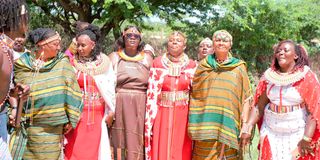Widowed by climate: Indigenous women now demand action

Leaders of the Indigenous Women Council during an assembly held at Archers Post on May 14, 2024. They decried the lack of climate change mitigation measures to cushion them from GBV, among other ills.
What you need to know:
- Indigenous women from Asal have called on the government to take proactive measures to minimise climate change-related disasters like droughts and floods.
- They said these disasters have led to a rise rising female-headed homesteads, as women are left widowed or separated from husbands unable to cope with the loss of livestock, their primary livelihood source.
Indigenous women from 23 arid and semi-arid lands (ASALs) have urged the national government to proactively minimise climate change-related disasters that contribute to a rise in sexual and gender-based violence (SGBV).
Under the Indigenous Women Council (IWC) umbrella, participants from various pastoral communities converged in Samburu County, lamenting how women and girls bear the brunt of weather-related calamities, despite authorities having prior knowledge of impending hazards.
"We've just emerged from a severe drought that killed thousands of our livestock. The few survivors have now been swept away by floods. These disasters could have been minimised had relevant authorities taken mitigation measures instead of reacting to situations already upon us," said Nuria Golo, a representative from Marsabit County.

Indigenous Women Council convener Jane Meriwas, (left) and Nuria Goro during the women's annual assembly at Archers Post Township, Samburu County on May 14, 2024.
Heavy rains and floods pounding parts of East Africa for nearly two months have submerged thousands of acres of croplands and killed thousands of livestock, risking food shortages in a region recovering from the worst drought in 40 years.
According to humanitarian aid organisation Action against Hunger, recent floods led to nearly 10,000 livestock losses and destroyed over 41,000 acres of cropland. The National Disaster Operations Centre and Kenya Red Cross Society estimate 60 rural roads connecting farmers to fresh produce markets have been damaged.
Nuria, a women's rights activist, said homesteads and schools in semi-arid northern Kenya have been submerged, leaving locals facing hunger, potential waterborne disease outbreaks, and girls dropping out of school.
Speaking at Archers Post Township, Samburu County, during the IWC Annual General Meeting, the Marsabit Women Advocacy and Development Organisation (Mwado) director addressed grassroots representatives from pastoralist, hunter-gatherer, and fisher folk communities.
The women gathered to reflect on challenges facing women and girls in patriarchal societies, including climate change effects, women's inclusion in land tenure rights, protecting unregistered community lands, and SGBV contributing factors.
Jane Meriwas, the meeting's convener, noted droughts and floods directly link to SGBV, where young girls are married off to fetch livestock from suitors as restocking after adverse weather kills animals.
"We're witnessing a new phenomenon of rising female-headed homesteads in pastoral communities. This results from widowhood through deaths from pasture and water conflicts, marriage separations where men, unable to cope with livestock loss – their livelihood – either end their lives or become mentally ill," Jane explained.

A section of indigenous women drawn from 23 Asal counties during their annual assembly at Archers Post, Samburu County on May 14, 2024.
The women resolved to unite in promoting peace in their areas plagued by cattle rustling, banditry, and resource conflicts.
"As mothers, we know the pain of childbirth and raising children. No woman celebrates her son's death during cattle raids. We're ready to work with county governments through Kenya's Climate Change-Financing Locally Led Climate Action program," said IWC Chair Grace Lolim.





